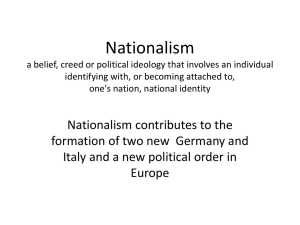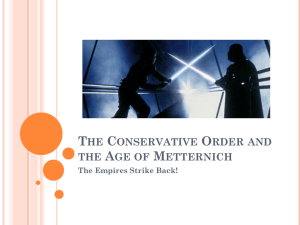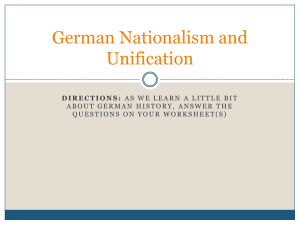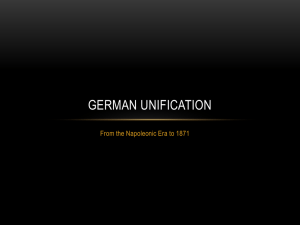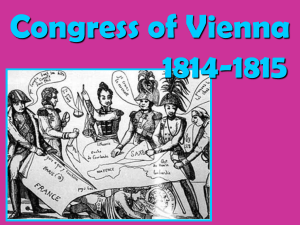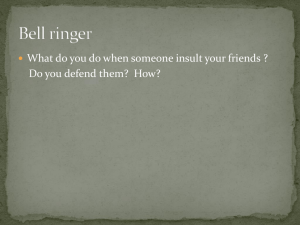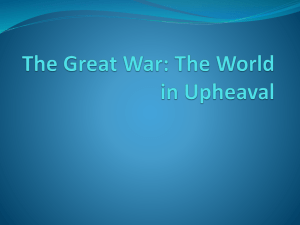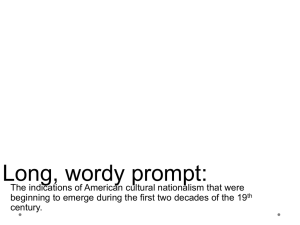Higher Germany Issue1 new
advertisement
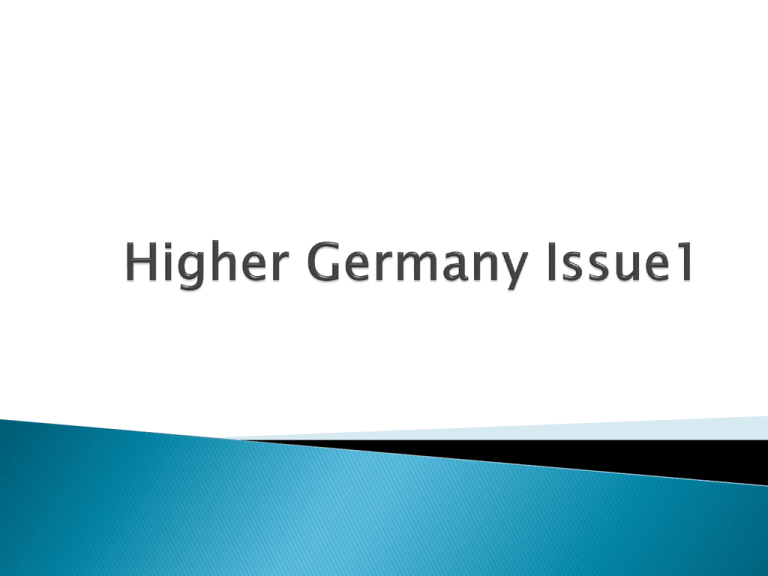
1. 2. 3. 4. Economic factors; the Zollverein; Cultural factors/Role of the Liberals. Military weakness/ Napoleonic Wars; Effects of French Revolution GERMANY- SEPARATE NAPOLEON- 400 STATES- 39 (CONFEDERATION OF THE RHINE) NAPOLEON GONE- BUND AUSTRIA- ANTRI NATIONALIST PRUSSIA- POWERFUL FREDRICK WILHELM(FR) 1848 REVOLUTION- DESIRE FOR CHANGE. RESULT FRANKFURT PARLIAMENT, FR TO LEAD- DISPUTES. CRUMBLE. OLD PRINCES RETURN TO POWER. ERFURT UNION- FR TRIES TO HEAD UP A UNITED GERMANY. AUSTRIA SAYS NO, FR BACKS DOWN AT THE TREATY OF OLMUTZ. Germany was not one country until 1871 Instead it was made up of lots of small independent states We need to find out how it became a united country – what factors were involved? For a country to be united, its people need to feel nationalistic What is nationalism, or to feel nationalistic? the belief that people sharing the same language and culture should be ruled by their own government. It is a feeling of loyalty that causes people to think of themselves as a nation During the C19th and 20th nationalism was a concept which developed in several countries, including Germany. It was such a powerful force that it could unite many different countries into one nation Nationalism has been a cause of war? Nationalism has been the cause of some terrorist activity around the world? Nationalism has been the cause of some colonies seeking independence from their Rulers? Nationalism has been a cause of war? and II Nationalism has been the cause of some terrorist activity around the world? World War I IRA, ETA, Nationalism has been the cause of some colonies seeking independence from their Rulers? India, many African countries, Indonesia Overall, nationalism is a very potent and powerful force Read the hand out on the Growth of Nationalism – use your own words to make notes on What makes one nation unique from others What is ‘essential’ in the definition of a nation Who / what did people used to be loyal to When did people begin to give their loyalty to their nation What event was of great importance in this NATIONALISM Definition: It is a difficult concept to define but a good definition is the belief that belonging to a nation is more important than belonging to a town, province, class, social group or religious group, and that the nation should do everything in its power to defend its interests and identity. So, in a way it’s a ‘state of mind’ inspiring a large majority of people who share a common culture, language, religion, history and defined territorial area. Reasons for the growth of nationalism in Europe, early 19 th century: Before the 19th century, most people’s loyalty tended to be towards a monarch, religion or, more likely to a landlord. Countries had been exchanged by conquest or inheritance with little regard to the preference of their inhabitants. In the 19th century, more loyalty was given to the nation. The French Revolution of 1789-1799 and the subsequent Napoleonic Empire was of great importance in fostering this development. Napoleon indirectly supported the rise of nationalism by abolishing many of the smaller states of the Holy Roman Empire which were feudal barriers in the way of national unity. The American Wars of Independence in the 1770’s also influenced people’s courage to overthrow an oppressor. The writings of philosophers, intellectuals and poets enlightened people on their rights and of their history. The Romantic Movement was an important cultural movement in this regard. Thus by 1815, the idea of Nationalism was widely understood in Europe. However, it was not a strongly held idea and to many of the monarchs who ruled Europe after the defeat of Napoleon, it was something to be destroyed. They wanted to make sure the devastation and disruption following the French Revolution and the Napoleonic Wars would never again happen. They met at Vienna in 1815. Use the hand outs/p.6/7 of the gold textbook. Read as a class the situation of ‘Germany’ in 1815. We will see 3 types of nationalism beginning to grow in Germany: 1.Political Nationalism Some people wanted a single German government to represent them and wanted more say in the running of their country 2.Cultural Nationalism Some people wanted to be united with others who they shared things in common with – language, traditions, national dress ….. 3.Economic Nationalism Some people believed that if the states worked together then they’d be more financially better off Population growth ◦ 1816 – 25 million ◦ 1845 – 34 million Growth of towns (urbanisation) ◦ 1815 only 10% of Germans lived in towns ◦ By 1840s about 30% lived in towns Growth of industry (industrialisation) ◦ 1815 industry made up of small workshops, many still in rural locations. ◦ By 1840s large cotton mills, iron and engineering works appearing MORE PEOPLE LED TO A GROWTH OF COMMUNICATION. Prussia acquired the Rhineland in 1815 This gave a huge boost to her economy However this was hindered by several factors: All states applied taxes to goods entering their territory Furthermore, all the different states had different weights and measures systems, different currencies and different taxes Prussian businessmen wanted to change this to maximise their profits The Prussian Customs Union was set up in 1818 The red line is the border of the Bund In 1815, Prussia gained coal and iron resources and access to the River Rhine. To encourage trade Prussia formed a customs union in 1818 that by the 1830s was called the Zollverein. The Zollverein was a prototype of a ‘united Germany’ under Prussian control that excluded Austria – Kleindeutschland. The Zollverein also helped Nationalism to spread. The new railway network, centred in Prussia, also helped to bring German states together. William Carr has called the Zollverein “The mighty lever of German unification.” By 1836, 25 of the 39 German states had joined this economic free-trade area (Austria was excluded). They enabled the transport and exploitation of German natural resources. Economic co-operation between German states encouraged those seeking a political solution to the issue of German unity. Read Blue P.109-110 or Gold p. 13-17 Summarise in your own words What the Zollverein was Who joined and when Summarise why Prussia set it up Summarise Austria’s exclusion from the Zollverein use the table on p.13 (gold) or p.109-110 (blue) to create a graph which shows Germanys expansion. The Zollverein was important because: ◦ Prussia’s control of the Zollverein put them at the heart of the German states. ◦ The rail network was developed putting Prussia again at the centre. This rail system would later be used for Prussian controlled wars in Bismarck’s wars of unity. ◦ Prussia became increasingly stronger economically ◦ Austria was not in the Zollverein – becoming isolated ◦ It set the example of working together economically and a precedent for working together politically in a Prussian controlled united Germany. ◦ This appealed to everyone! How important was the Zollverein in the growth of Nationalism in Germany? 9minutes. Fichte described ‘Germany’ as the fatherland where all people spoke the same language and sang the same songs. German poets and authors, such as the Grimm brothers, and composers such as Beethoven, encouraged feelings of national pride in the German states. However Golo Mann (HISTORIAN) wrote that most Germans ‘seldom looked up from the plough’. He doubted the influence of artists most Germans knew nothing about. In 1830 anti-French feelings promoted ‘the watch on the Rhine’ and nationalist festivals such as Hambach (1832) also encouraged nationalist feelings. Language Martin Luther (10 November 1483 – 18 February 1546) Initiated the Protestant Reformation. Translated the Bible into German from Latin. The basis for a common German language known as‘High German’ Goethe: 1749 – 1832 writer, poet, playwright. Famous for play: Faust The Brothers Grimm 1785 - 1863 They are among the best-known story tellers of folk tales from Europe, and their work popularized such tales as "Rumpelstiltskin", "Snow White", "Sleeping Beauty", "Rapunzel", "Cinderella", "Hansel and Gretel", Immanuel Kant 1724 - 1804 he believed that all people are fundamentally rational beings For instance, holding the maxim kill anyone who annoys you and applying it universally would result in a world which would soon be devoid of people and without anyone left to kill. Thus holding this maxim is irrational as it ends up being impossible to hold it. Karl Marx and Friedrich Engels: Creators of the Communist Manifesto 1848. Fathers of communist economics and ideology. Famous composers between 1750 - 1825 Johann Sebastian Bach Ludwig van Beethoven Brahms Handel Mendelsson Strauss Wagner Summary 25 million spoke the same language – ideas were shared United by language, it was felt they should be united politically Poets like Goethe and Heine praised the nation state Writers and musicians were inspired by the idea of a Great Germany – the Brothers Grimm + Beethoven The Princes of the 39 states originally stirred up nationalism to drive out the French from their states Universities helped to promote national feeing – Bonn, Berlin and Munich especially This period of time, 1800 – 1830s, where the Arts prospered and encouraged nationalism to grow, was called the Romantic Movement. Nationalist feelings were beginning to be expressed by some groups of Germans in the states. Their enthusiasm was of the ‘romantic’ kind – this meant they had no clear ideas of how to unify Germany into on Great country 1817 The Wartburg Festival, Saxony. ◦ 500 students got together to celebrate the 4th anniversary of the defeat of Napoleon. ◦ Demonstrations against undemocratic government in Germany and Austrian interference in Germany. ◦ Burned books of anti-nationalist authors. ◦ Burned effigy of Metternich ◦ 1819 a student murdered anti-liberal writer, Kotzebue Response of Metternich to Wartburg demos: ◦ The Carlsbad Decrees of 1819. (draconian) Strict censorship of the press introduced in Germany Student societies suppressed Political meetings banned Liberal university teachers sacked Student leaders imprisoned Conclusion • The importance of cultural nationalism in the growth of nationalism Promoted the idea that there was a common German identity Was never strong enough to unite Germany Limited to intellectuals and middle class (low numbers) Not well organised No military strength Did not appeal to the masses (working class) Read blue p82 – 85 (up to heading) or Gold p.9-12 Make notes on: Main unifying force and effect of it - you should mention Fichte’s quote – P83 What does Stiles suggest about nationalism What originally encouraged people to be nationalist Where were nationalists feelings first expressed and by whom The Burschenschaften – Examples of who encouraged nationalism and how You will soon read about these. These were laws to prevent cultural nationalism of students. Metternich (the Austrian Chancellor) wanted to stop nationalism in Germany (Austria had a big empire herself) so he passed laws to stop some student organisations, sack professors who were teaching radical/nationalist views and censor papers. This helped prevent Nationalism (but we will look at this in more detail in issue 2) Overview: After 1815, Metternich became worried about the growth of student societies, many of which supported Liberalism and Nationalism. The Karlsbad Decrees of 1819 tried to stop the spread of new ideas. At the same time, many Germans began to think in a more nationalist way and became more interested in their common culture. This was called Cultural Nationalism Karlsbad Decrees After 1815 many students criticised Metternich’s power and embraced nationalism. The students went around the universities spreading their ideas. Metternich’s effigy was burned at a festival and he became worried about these nationalist and liberal ideas spreading and weakening Austria’s power. In 1819, the Karlsbad Decrees, passed by the Diet of the German Confederation, banned student societies and censored newspapers. Metternich may have driven these societies underground but their will was strengthened. Cultural Nationalism German poets, authors and composers, for example the brothers Grimm and Beethoven, were beginning to encourage feelings of national pride in the German states through their work. There was little that Metternich could do about this. One important academic, Johann Fichte who was the head of the University of Berlin up to his death in1818, spoke about how Germans should recognise a broad national identity. He called Germany the ‘Fatherland’ and spoke about Germans living without interference from foreign powers. Fichte’s prominent position in Germany meant his statements were influential. However, it is important to remember that the impact of this cultural nationalism was largely limited to educated Germans. Why this is less important that economic nationalism? Use p. 85-86 (blue) and p. 11-12 (gold) and make up a table of evidence: Evidence that cultural nationalism was evident Evidence that cultural nationalism was limited. (Remember Golo Mann (HISTORIAN) wrote that most Germans ‘seldom looked up from the plough’.) Get a copy of the Cultural Nationalism paragraph from Miss Glynn and glue this into your notes. Get 3 different colour highlighters and in the paragraph highlight: Argument that the topic (cultural nationalism) was important Evidence Argument that the topic (cultural nationalism) was not the most important. The growth of the population, industrialisation and urbanisation, created a large, discontented urban working class Appalling working and living conditions led to social unrest and demands for political reform. Improvements in transport made people more aware of the wider world. The development of industry led to the growth of a wealthy middle class. They had economic power but no politcal power. They pressed for political reform and saw unification as the only way forward. The peasants who lived in the countryside were unhappy with demands for higher rents from their landlords. They also had to work harder to produce more food for a growing population The urban working class who lived in the towns and cities were unhappy with shortages of food, increasing prices, wage cuts and unemployment = a drop in their standard of living These 2 groups simply wanted to survive and demanded an improvement in their living standards. They DID NOT demand any political change The middle class were frustrated by a lack of professional jobs and their lack of power and influence They demanded the creation of a united Germany and more political say All of the groups demanded CHANGE The educated middle-class had become important to German society. They were the doctors, lawyers and business men, who helped make the German states prosperous. Across all 39 states, this middle-class wanted more rights and freedoms as German subjects to reflect their contribution to German states' success. They wanted freedom of speech and an elected parliament that would represent their interests. They thought these ideals would best be realised and protected in a united Germany with a new constitution. By 1859, groups of doctors, lawyers, teachers and businessmen formed the Nationalverein. This organisation became the Liberal Party, which actively campaigned for reforms such as parliamentary elections. Middle class - Nationalism was very much a middle class theory which was not widespread The Intelligencia – intelligent educated people Students – Bonn, Berlin, Munich Professors – who encouraged students to be ‘nationalist’ BUT, not everyone felt nationalist – it was very much a middle class movement The nationalism experienced in Germany at this time was therefore NOT going to lead to a unified Germany by itself ◦ Ordinary Workers were not concerned by nationalism WHY? ◦ Uneducated people didn’t consider a united Germany WHY? They had other priorities – food, shelter, day to day survival They simply wanted an improvement to their standard of living and didn’t equate that with nationalism Many were illiterate and couldn’t access or understand the poetry, literature, concerts …and so on Historians suggest that there is some evidence that workers were beginning to take a real interest in politics and thinking about how they could improve their lives This shouldn’t be overestimated though Read last section of p85 (blue) p. 11(half way down the page GOLD) and summarise it You should make a note of Stiles’ quote and explain it Largely a middle/upper class ideal. Need to be educated to understand it. Stiles “Liberalism and Nationalism remained largely middle-class before 1848” Carlsbad Decrees stifled some of the work of Nationalists. How important was the role of the Liberals in the growth on Nationalism in Germany? 9minutes. Things that happened in neighbouring France had an effect on Germany The French Revolution took place in 1789. What is a ‘revolution’? This was a time of vast change an overhaul within the country. It believed in: ◦ Liberalism (freedom) ◦ Equality ◦ Power to the people. Part of this process was the seizing of power by the working and middle classes (away from the upper class elite) What effect would this have on ‘German’ people living near France? The French Revolution For centuries, the quality of life in Europe had been determined by the status that one held. This status could not be attained, but was instead determined by the family to which someone was born. If you were born to a poor family, your life would be one of poverty. No matter how hard an individual worked, it was impossible to rise above this fate. The wealthy enjoyed a life of ease, comfort and recreation. Day after day, they pursued the pleasures of European society, while 97% of Europe’s people struggled just to survive. This gap between the wealthy and the poor created resentment. Those at the bottom saw the wealthy grow increasingly richer, while the poor got nothing. Then, in 1776, something unthinkable happened. A group of people at the bottom of society rebelled against those who were at the top, and what was more remarkable, they won. The British Colonies in America declared their independence and then enforced it by beating back the most powerful military on Earth. This sent shockwaves throughout Europe, and gave hope to many povertystricken peasants who wanted to see the powerful aristocracies of Europe fall. If America could do it, why couldn’t they? Why couldn’t they rebel and create a new, fairer society? As a class read p. 9-11 of McKichan Take notes about what you learn. Crash Course French Revolution After the Revolution and as part of the expansion of French power, from 1792 there were 20 years of war as Napoleon's French troops conquered most of mainland Europe. With so many small independent German states, approx 300 - 400 of them, what message did this send to Napoleon? They were an easy target for others like the French to threaten People throughout the states grouped together for protection – together they were stronger compared to being weak and easy to conquer as individual states This uniting together encouraged nationalism to grow Take Notes on What happened in 1840 What area did France threaten Who did this territory belong to How did the other neighbouring states respond? Did they ignore the French threats or did they support their neighbour who was being threatened ….. What did their reaction show? Overall The French had a great influence on the German states ◦ The Germans got a taste of Revolutionary ideas from the French Rev 1789. ◦ The Germans were united in their hatred of the French following being conquered during the Napoleonic Wars. ◦ They saw that together they were stronger so they grouped together for protection ◦ The French threats in 1840 showed that the states cared about each other and would support each other ◦ McKichan “ Napoleon quite unintentionally laid some of the foundations for the eventual unification of Germany” ◦ McKichan re nationalists “Napoleon’s treatment of Germany was increasing heir number year by year” Impact of the French invasions •Ideas of the French Revolution appealed to the middle classes in the German states. •Impact of Napoleonic wars — many Germans argued that Napoleon/France had been able to conquer German states pre1815 due to their division as separate, autonomous territories. German princes had stirred national feeling to help raise armies to drive out the French, aiding the sense of a common German identity with common goals. How important was the INFLUENCE OF THE FRENCH in the growth on Nationalism in Germany? (here you can talk about the French Rev and Influence of Napoleon) 9minutes. Napoleon was defeated in 1815 at the Battle of Waterloo. The German states now had the task of changing things and undoing Germany of Napoleon’s legacy • Chancellor Metternich was a very traditionalist leader of Austria. • He dominated the Bund • Austria had a lot of influence in Germany • Metternich did not want ideas of Nationalism and unity spread within Germany. Why? •Article 2 of the Confederation was for: –“The maintenance of the external and internal safety of Germany and the independence… of the individual German states” The German Confederation Read p102 – 103 blue, paragraph 1 only, p.1 and p.3-4 gold of the textbook and make notes on: What did Napoleon reorganise into the Confederation of the Rhine? What was the Confederation of the Rhine? The German Confederation / Bund What it was When and why was it established Who was in charge Were nationalists happy with this – explain The ‘German’ states wanted change, to undo Napoleon’s legacy The German Confederation (Bund) set up in 1815 Contained 39 states led by Austria A loose association / meeting places the states Nationalists disappointed: 1. Germany was not unified 2. Bund to be led by anti nationalist Austria The Bund would not unify the states but instead aimed to keep them separate and weak Mitchell suggests that ‘The Bund was more a means to perpetuate (continue) the division of Germany than to unite it’ BUT, NATIONALISM STILL CONTINUED TO GROW SQA “•1848 revolutions in Germany raised consciousness greatly even though they failed. “ Revolutions engulfed Europe, including the states of the Deutscher Bund. Reasons: Harvest failures : Potato famine 1846-48 1847 wheat prices x2 1848 cholera epidemics Industrial depression Lack of response to crises by undemocratic governments (the autocracies) Metternich unable to keep control so he fled to Britain. revolutions break out in Vienna, North Italy, Hungary and Prague Austrians could not influence the affairs of Bund states. This affects German nationalism because: • without control of Austria, nationalist revolutionaries could now demand democratic reforms and unification Berlin (Prussia) 1848 (McKichan p 36 – 38) Demonstrations and street fighting outside the royal palace. 300+ rioters killed by government soldiers. Bodies of the dead and wounded were paraded in front of King Frederick William IV (King of Prussia). KFW IV deeply saddened by deaths and announces his support and leadership for liberty and a unified Germany. A new Parliament of the German people was to meet in Frankfurt, May 1848. The nature of the Frankfurt Assembly Elected members were middle class, well educated. Most were liberals and nationalists Wanted a united Germany with a monarch as Head of State. A parliament elected by middle class /well educated ie. People like themselves. : The purpose of the Frankfurt Assembly Decide on the future for Germany Klein or Grossdeutschland Monarchy or democracy Draw up a constitution for a united Germany Issues the Assembly disagreed over If KD or GD who would be offered the crown? Austria or Prussia or who? Workers who were in Assembly (Minority) called for a republic to protect them against exploitation by their bosses. The business owners (the middle class members) were the bosses who claimed workers demands were too much and would destroy business. Collapse and dissolution of Frankfurt Assembly 1848 into 1849 revolutions die down Austrians regain control over its own territories by March 1849 No chance Austrians wanted to be part of a united and liberal Germany. So, now the Frankfurt Assembly offer the crown of a KleinD to FWIV. FW IV has restored power in Prussia as well Changes his mind about leading a united and liberal Germany He refuses to accept the crown! Other monarchs ignore the FA constitution and withdraw their states. FA dissolved. Possibility for unification from above. The League of the Three Kings KW IV still interested in Unification but on his terms. Ie not to be controlled by his subjects. Invites rulers of Saxony and Hanover to form a federation of states with an army and foreign policy controlled by Prussia. Other states join and meet at Erfurt (Saxony) March 1850. This makes up the Erfurt Union. Erfurt Union not very strong as other German states were suspicious of Prussian motives and scared of Austrian reaction if they joined. By 1850 Austria had a new, strong Chancellor, Prince Schwarzenberg. Austria recovering fast after revolutions. Austria crushes the Erfurt Union and restores the power of the Bund: Schwarzenburg objects to plan of Erfurt Union plan to have KleinD. Persuades majority of German states to meet at Frankfurt to plan restoration of pre 1848 confederation (Bund). Prussia does not attend. Old Bund arrangement agreed. Test case: Hesse Cassel asks for military help from Bund to put down a minor rebellion. Bund helps. But HC is ally of Prussia and Austrian troops sent in to help HC. Prussia could have declared war on Austria but doesn’t as it is not ready for war and fears power of Austria in alliance with Russia. Nov 1850, Treaty of Olmutz. Meeting of Austria and Prussia. Prussia is forced to abandon the Erfurt Union. This a humiliating defeat for Prussia. Shows Austria politically stronger than Prussia. Reasons for failure a) Austrian power and influence over the German southern states like Bavaria had been re established by 1850 and they were reluctant to support Prussia’s desire for a Kleindeutschland b) Prussia was forced to abandon the EU because it was not strong enough militarily or politically to exclude Austria from any German union at the time. Most European countries experienced revolution in this year. (BLUE) Read p93, Attitude of the Peasants, up to p95, The Forces of Change (Gold) Read p. 21-p.24 The Forces of Change. Make notes on the different groups who protested and their reasons for this – use sub headings to divide your notes In Germany Liberals demanded: ◦ Freedom of speech ◦ Freedom of press ◦ Political rights Peasants and Workers demanded a better standard of living Middle class demanded job opportunities and to have more power and influence Nationalists also wanted: A united Germany run by an elected ‘national’ parliament. They all had one thing in common – they wanted CHANGE Violent riots broke out in the German states demanding for change Metternich feared for his life and fled to Britain Were the rioters successful? NO Read p 99 (Blue) or p. 29/30 (Gold) and make notes on the 6 reasons for the failure of the 1848 Revolutions Read the 1848 revolutions hand out and take notes if you require confirmation of events. To what extent can it be argued that political issues were the main reason for a growth in nationalism? 10mins Remember the Bund. The 1848 Revolution Arguments FOR AND AGAINST. French Revolution – effect of this on the neighbouring ‘Germans’ Effect of the French Occupation / Military weakness of individual states Cultural factors and the Romantic Movement bringing people together The Middle Class / Intelligencia driving forward nationalism But none of these would unite the states – just not powerful enough. Something else was needed Economic factors Cultural factors – „Romanticism‟ The main unifying force was language – 25 million Germans spoke the same language and shared through it the same culture and literature. - Writers and thinkers (eg Heine, Fichte, Goethe, Brothers Grimm, Schiller, Hegel) encouraged the growth of a German consciousness. - Post-1815 nationalist feelings first expressed in universities. - The Hambacherfest and student demonstrations – little accomplished by the students. Economic factors Urbanisation and industrialisation in the German states led to frustration at the political fragmentation of Germany which can be argued to be the most important obstacle to German economic development. Middle-class businessmen called for a more united market to enable them to compete with foreign countries. Prussian economic expansion proceeded steadily in the 19th Century. Prussia‟s gain of territory on the River Rhine after 1815 (leading to a drift in power away from Austria and towards Prussia as the latter began to build on the rich resources such as coal and iron deposits) meant it had good reason to reach an agreement with neighbours to ensure relatively free travel of goods and people between its lands in the east and the west. Businessmen complained that tax burdens were holding back economic development. Prussia created a large free-trade area within Prussia herself which aided the needs of businessmen. The Zollverein was the „mighty lever‟ of German unification. By 1836, 25 of the 39 German states had joined this economic free-trade area (Austria was excluded). Railway/road development from the 1830s onwards ended the isolation of German states from each other. They enabled the transport and exploitation of German natural resources. Economic co-operation between German states encouraged those seeking a political solution to the issue of German unity. Political factors Ideas of the French Revolution appealed to the middle classes in the German states. German princes had stirred national feeling to help raise armies to drive out the French, aiding the sense of a common German identity with common goals. Growth of Liberal political beliefs. The 1848 Revolutions in Germany raised consciousness greatly even though they failed. Military factors The impact of Napoleonic wars meant many Germans saw that Napoleon/France had been able to conquer the separate, autonomous German states before 1815 due to their divisions. Growth of Burschenschaften pre-1815 dedicated to driving French from German soil – zealous but lacking a clear idea of how best to accomplish the task. How important were economic factors in the growth of nationalism in Germany, 1815-1850? There are three basic types of essay question on this topic:A. Why did nationalism grow/What were the reasons for the growth of nationalism? DO THE NAMED FACTOR FIRST. WEIGH UP THE FACTORS AS YOU GO ALONG – DON’T WAIT TILL THE CONLUSION TO COMPARE THE FACTORS TO EACH OTHER IN TERMS OF THEIR IMPORTANCE. 1. Intro – SEAF (start date – 1815, end of Napoleonic war/creation of Deutscher Bund, end date – 1850, still no united German state, was a growth of nationalism due to several factors ……..) 2. Impact of French Revolution and Napoleonic Wars 400 – 39 states, more on end of Napoleonic wars and creation of Bund How Napoleon triggered nationalism in German states, how Bund pleased but frustrated nationalists. 3. Culture Language, race -‘volk’, music, art, literature, history (Romans). Burschenschaften, Wartburg Festival 1817, Carlsbad Decrees ‘nipped this nationalism in the bud’, Hambach Festival 1830 ‘Talkers and dreamers with no real plan of action’ –McKichan? Or do all revolutions need thinkers to ‘sow the seeds’? 4. Economy Prussian economy Zollverein – how it united the German states economically, how it led to other things that contributed to German states moving together e.g. railways, urbanisation. Was the Zollverein more than an economic union? Stiles Vs AJP Taylor 5. 1848 Revolutions 1848 revolutions and Frankfurt Assembly 1848/9 – causes of these revolutions – harvest failure, economic slump, unemployment, Cholera epidemic – how this stimulated nationalism in the German states, but how attempts to unify states failed when revolutions over. 6. CONCLUSION Nationalism grew but ultimately failed to unite the German states by 1850. Which factors were most important in the growth of German nationalism? WEIGH UP the factors one by one – finish with the one that you think was most important. Include a good quote if you can. 1. 2. 3. 4. Economic factors; the Zollverein; Cultural factors/Role of the Liberals. Military weakness/ Napoleonic Wars; Effects of French Revolution OR Economic Political Military Cultural Economic Factors – the most important in the growth of a German national consciousness Urbanisation and industrialisation led to middle class demands for change – a more united market place was needed for economic success The Zollverein aided economic unity and a German national consciousness developed The member states traded and acted as one country by late 1830s Economic unity paved the way for political union Economic Importance Railway development from 1830s onwards ended isolation of the states Also enabled transportation of goods between states > encouraged trade Prussia gaining the Rhineland in 1815 began a drift in power away from anti-nationalist Austria towards Prussia as the key state Coal and iron industry boomed in the member states Economic success set precedent for success in other realms 1. Cultural factors and their importance Language as a unifying force - 25 million Germans spoke same language Through this they shared the same culture, traditions and histories Romantic Movement - works of poets, writers, musicians, inspired by the idea of a great Germany, encouraged a growth of national consciousness - Brothers Grimm, Heine, Beethoven, Goethe Mainly middle class movement up to 1848 Political Factors and their importance Ideas of French Revolution, 1789, appealed to the educated middle class Liberty (freedom), Equality and, Power to the people The Germans got a taste of Revolutionary ideas. Vormarz period – see p 85. Some evidence of working class beginning to take interest in politics 1848 Revolutions – raised consciousness greatly among nationalists and liberals, despite them failing Military Necessity The states had been conquered by Napoleon during the wars of occupation when they were weak and separated The Princes had stirred national feeling by encouraging the ‘Germans’ to stand together to drive out the French Burschenschaften – nationalist student groups formed who wanted to drive out the French 1840 French threats to the Rhineland – Prussia’s neighbours came to her support – showed that the states came together out of military necessity Cultural factors were of some importance in the growth of a German national consciousness between 1815-50. The fact that 25 million Germans spoke the same language enabled them to access their shared cultures, histories and traditions. A German national consciousness was also promoted through the Romantic Movement which was inspired by the ideas of a Great Germany. Yet, political factors also played their part. The ideas of the French Revolution impacted on the Germans who rose up in 1848 and showed they shared a common national consciousness. In addition to this, the fear of further French invasions meant that Germans came together through sense of military necessity. However, above all else, economic factors played the most significant role in developing a common German national consciousness. The development of the Zollverein meant that member states traded and acted as one country and the subsequent development of the railways broke down the barriers between the states. Therefore, although cultural factors were of some importance in the growth of a German national consciousness, economic factors were of far more significance between 1815-50. Every essay needs some historiography – use of quotes which are explained and back up the points you mention The Confederation and the Individual States Mitchell - The Bund was more a means to perpetuate the division of Germany (than to unite it) Article 2 of the Act of Confederation - 'The aim of this confederation shall be the maintenance of the external and internal security of Germany as well as the independence of the individual German states‘ McKichan - The way in which the confederation worked was designed to make it difficult for it to develop into a united Germany Carr – He (Metternich) had no doubt that demands for freedom would inevitably lead to the destruction of the Austrian Habsburg Empire McKichan - The events of 1840 show that nationalism had some impact on people throughout Germany Thomson suggests ‘The French united the German states in a common feeling of resentment against them’ – showed that people felt common bond ◦ McKichan “ Napoleon quite unintentionally laid some of the foundations for the eventual unification of Germany” o o Thomson suggests ‘The French united the German states in a common feeling of resentment against them’ – showed that people felt common bond McKichan re nationalists “Napoleon’s treatment of Germany was increasing heir number year by year” Stiles - Even in 1815 there were tens of thousands of people ….. who felt passionately that Germans deserved a Fatherland McKichan - The Carlsbad Decrees certainly succeeded in keeping Germany quiet for a considerable period of time McKichan – To keep the dark forces of nationalism at bay, Metternich relied on the prestige of Austria and the goodwill and co-operation of the German princes Fitche – Those who speak the same language are joined to each other by a multitude of invisible bonds McKichan – Most historians agree that these ideas were held by relatively limited numbers of educated town dwellers Carr - 'It would be inappropriate to see the Zollverein as the forerunner of German political unity' Carr - The Zollverein was the mighty lever of German unification Stiles - The Zollverein was a force for unity in the 1840s and therefore a focal point for nationalist sentiments Stiles - (as a result of being leader of the Zollverein) 'Prussia came to be regarded by many as the natural leader of a united Germany' Carr - Railways were of great political significance. They helped to break down provincial barriers …. And underlined the need for national unification

